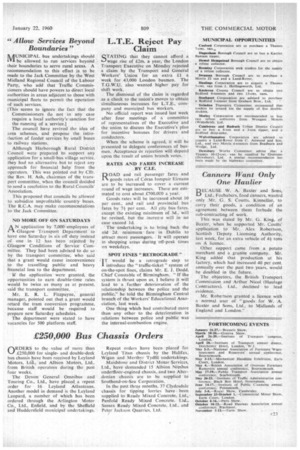"Allow Services Beyond Boundaries"
Page 61

If you've noticed an error in this article please click here to report it so we can fix it.
NAUNICIPAL bus undertakings should Pa be allowed to run services beyond their boundaries to serve rural areas. A recommendation to this effect is to be made to the Jack Committee by the West Midland Regional Council of the Labour Party, who add that Traffic Commissioners should have powers to direct local authorities in areas adjacent to those with municipal Beets to permit the operation of such services.
IThis seems to ignore the fact that the Commissioners do not in any case require a local authority's sanction for the running of a service.'
The council have revived the idea of area schemes, and propose the introduction of feeder services by small buses to railway stations.
Although Harborough Rural District Council were prepared to support any application for a small-bus village service, they had no alternative but to reject any approach for financial help' from the operators. This was pointed out by alr. the Rev. H. Ash, chairman of the transport committee, when the council decided to send a resolution to the Rural Councils' Association.
This proposed that councils he allowed to subsidize unprofitable country buses. The R.C.A. may make recommendations to the Jack Committee.
NO MORE OFF ON SATURDAYS
A N application by 7,000 employees of Glasgow Transport Department to have one Saturday in six off duty instead of one in 12 has been rejected by , Glasgow Conditions of Service Committee. They had been advised to do so by the transport committee, who. said that a grant would cause inconvenience to the travelling public and heavy financial loss to the department.
• If the application were granted, the opportunities to earn double-time rates would he twice as many as at present, said the transport committee. • Mr. E. R. L. Fitzpayne, general manager, pointed out that a, grant would retard the tram conversion programme, because staff would be required to prepare new Saturday schedules.
The department were stated to have vacancies for 500 platform staff.
L.T.E. Reject Pay Claim
STATING that they cannot afford L./wage rise of £2m. a year, the 'London Transport Executive on Monday rejected a claim by the Transport and General Workers' Union for an extra £1 a week for 43,000 London busmen. The T.G.W.U. also wanted higher pay for shift work.
The dismissal of the claim is regarded as a check to the union's moves to obtain simultaneous increases for L.T.E., company and municipal bus workers.
No official report was issued last week after four meetings of a committee of representatives of the Executive and the union to discuss the Executive's plan for incentive bonuses for drivers and conductors.
When the scheme is agreed, it will be presented to delegate conferences of busmen. Acceptance or rejection will depend upon the result of union branch. votes.
RATES AND FARES INCREASE BY C.LE.
ROAD and rail passenger fares and
• goods rates of COras lompair Eireann are to be increased to cover a current round of wage increases. These are estimated to cost about £700,000 a year.
Goods rates will be increased about 10 per cent., and rail and provincial bus fares by 7jper cent. All city bus fares. except the existing minimum of 3d., will be revised, but the increase will in no case exceed .1d. .
The undertaking 'is to bring back the old 2d. minimum fare in Dublin to attract more passengers. It will operate in shopping areas during Off-peak times on weekdays.
SPOT FINES " RETROGRADE " iTT would be a retrograde step to I introduce the " traffic-ticket " system of on-the-spot fines, claims Mr. E. J. Dodd, Chief Constable of Birmingham. "If the system is thrust upon us, I believe it will lead to a further deterioration of the relationship between the police and the public," he told the Birmingham Central branch of the Workers' Educational Association, last week.
One thing which had contributed more than any other to the deterioration in relations between police and public was the internal-combustion engine.












































































































































